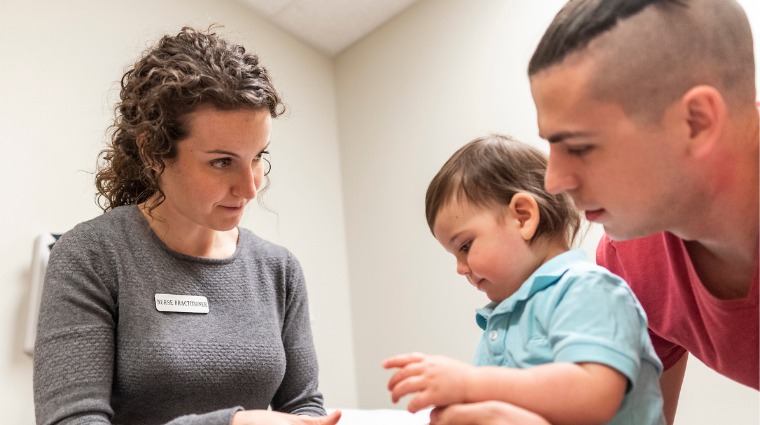
To honour National Nursing Week and the incredible work nurses do for our community, we’re highlighting the University of Regina and Saskatchewan Polytechnic Collaborative Nurse Practitioner Program (CNPP) and two impressive recent graduates, Jocelyn Schrader and Lara Metheral.
In partnership with the University of Regina, the CNPP offers an innovative approach to primary care nurse practitioner (NP) education.
An NP is a registered nurse (RN) with graduate level educational preparation who possesses advanced clinical knowledge and can autonomously assess; order and interpret diagnostic tests; diagnose; prescribe pharmaceuticals; and perform specific medical procedures within their legislated scope of practice.
The CNPP is an online graduate level program, which makes the program an attractive option for registered nurses across the country who are looking to balance their studies with their full-time jobs and other responsibilities.
Playing a bigger role in patient care
Jocelyn Schrader started the CNPP on a part-time basis in 2017 while teaching in the Practical Nursing program at Saskatchewan Polytechnic and working casually as an RN. Jocelyn is now a full-time community health nurse at Sturgeon Lake First Nation and is already seeing the benefits of advancing her education and skill set.
“As an RN, it was frustrating when my position or experience wasn’t respected. Despite having followed patients for weeks or months, I still had to phone for a physician’s order for simple electrolytes,” said Schrader. “I felt limited by the scope of practice and I wanted to play a bigger role in the patient’s care.”
Schrader’s expanded role has allowed her to participate in an Indigenous midwifery program in Sturgeon Lake, where she assisted with the first on-reserve birth in over 50 years.
Stepping up in the community and the classroom
Lara Metheral’s motivation to become a Nurse Practitioner came from her experience as an RN working with vulnerable populations, particularly in the areas of pediatrics and women’s health.
Metheral recognized that these groups could receive better care from a Nurse Practitioner, so she applied for the CNPP after hearing a radio advertisement for the program in July 2014.
“What I liked most about the CNPP was the combining of research, ethics, and advanced nursing knowledge and the application of those learnings in a clinical setting,” said Metheral.
When Metheral graduated, she became a preceptor and mentor for NP students in the clinical setting, which sparked an interest in teaching for Metheral that eventually led to her becoming an adjunct professor in the program.
“When you work in healthcare, it’s a lifetime of learning because things change all the time. Even as a provider and instructor, I’m still learning from my NP students.”
Metheral finds that among her students, some of the biggest reasons RNs are choosing to enter the CNPP are to improve patient outcomes, fill gaps in the healthcare system, and to advance healthcare research.
“Since we have students from across Canada in our program, it’s really interesting to hear their perspectives and while each province has its own unique healthcare challenges, at the end of the day, the common goal of all NP students is to improve patient outcomes.”
To learn more and apply, visit the Collaborative Nurse Practitioner Program website.
Published May 2022.

